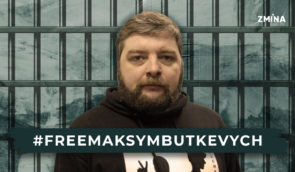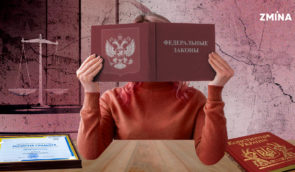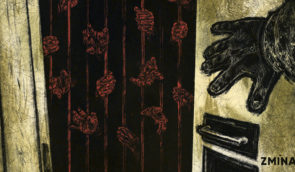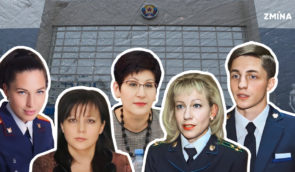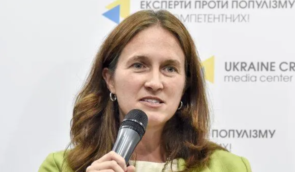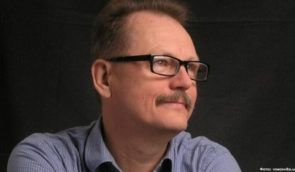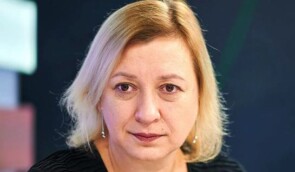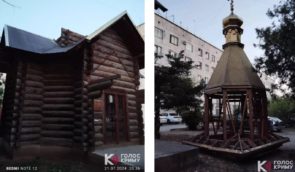‘Occupiers went on a rampage on March 27-28: they shot men of all ages indiscriminately’ A teacher from Bucha tells how she lost her husband and nephew
Viktoria Klimtsova, 47, and her elderly mother lived in Bucha until it was liberated from the occupiers. However, at the beginning of April, they left for Cherkasy region as Viktoria had no reason to stay any longer. On March 28, her husband Oleh, who had refused to evacuate not wanting to give an inch of his native land to the Russians, was shot by the Russian military.
The woman told ZMINA how her family, together with other residents of a five-story building on Sklozavodska Street, survived the occupation, how they supported the elderly and abandoned animals, and how the Russians massively murdered civilians, including her husband, in the last days of the occupation.
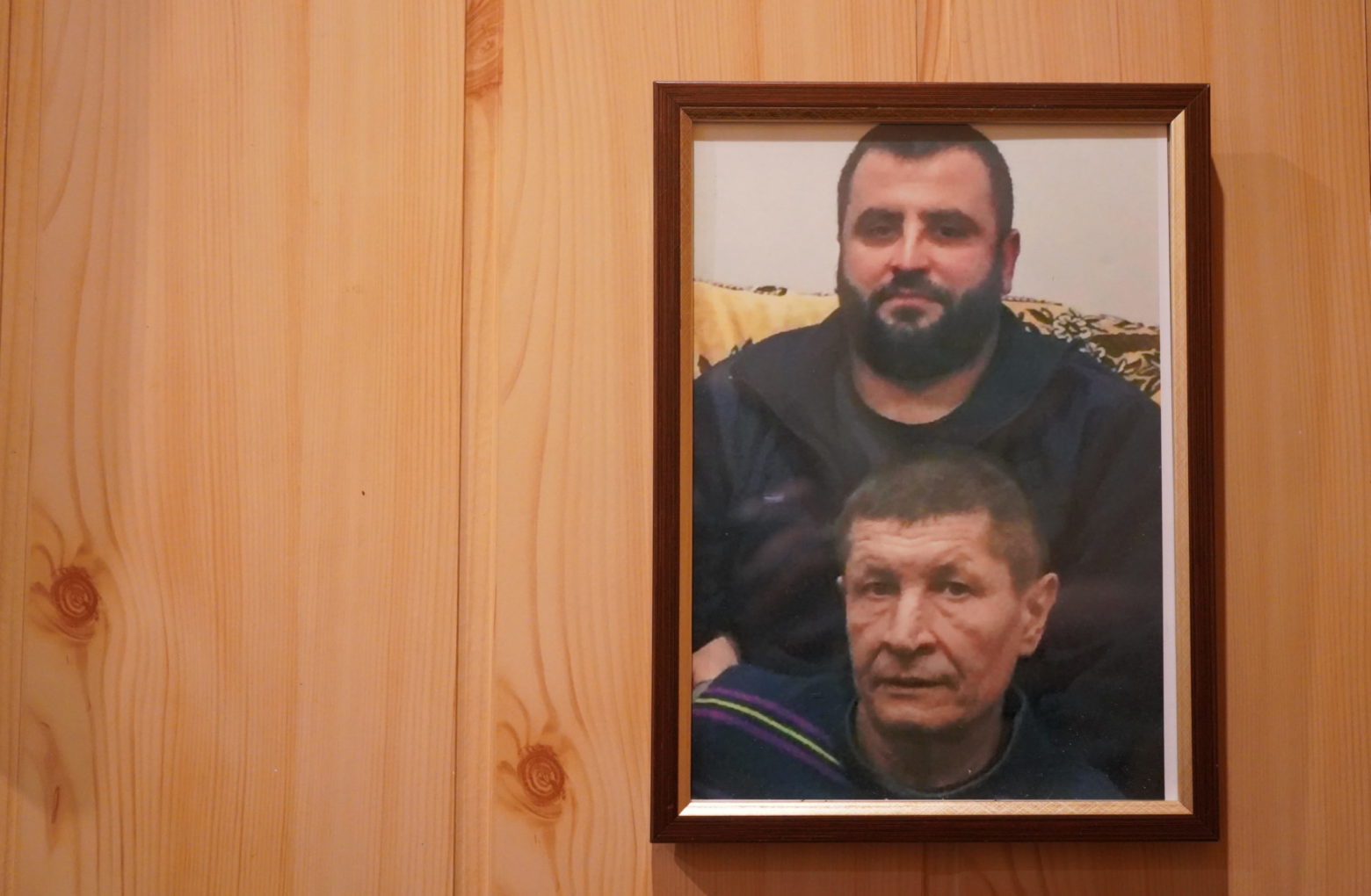 Viktoria’s husband Oleh and his nephew Andriy (above)
Viktoria’s husband Oleh and his nephew Andriy (above)“I made such a portrait of him for a tombstone. And this is him with his nephew Andriy, he was also killed,” Viktoria Klimtsova points to photos of her husband Oleh on the wall of the hallway of a small, cozy apartment in Bucha.
Here, in a five-story building on Sklozavodska Street, the woman was born and grew up. For 23 years, Viktoria worked as a teacher in a kindergarten – first at “Prolisok”, then at “Yablunka”.
There were four of them living in a two-room apartment – a married couple, Viktoria’s elderly mother, and a black puppy of an unknown breed named Lord. When the man brought the dog home shortly before the full-scale invasion, he told Viktoria that it was a Cane Corso. But she jokingly replied that it was not a Cane Corso but his adopted son, Lord.
Viktoria talks about her husband with sincere admiration and great love. He is eight years older than her, her neighbor across the stairs from early childhood.
“As a girl, I looked closely at him already when I was 17. Before that, I don’t remember him well, because he was a hooligan, jailed when he was a young boy, and served his sentence in Komi Autonomous Soviet Socialist Republic. He was a fighter for justice. When he considered something was wrong, he fought in his youth. When he became older, he realized that nothing can be solved with fists. But he preserved his character,” Viktoria describes her husband.
She remembers that when she was getting married at the age of 28, she was warned: “Oleh is a former convict, he will beat you.”
However, they had a happy marriage:
“We divided responsibilities, we didn’t even consider them as responsibilities, but I never knew the prices in the market, in the store. Water, gas bills, appeals to authorities, family doctors – he dealt with everything.”
Oleh worked as a handyman at a construction site. He loved animals. Before the dog appeared, the couple had many stray cats at home.
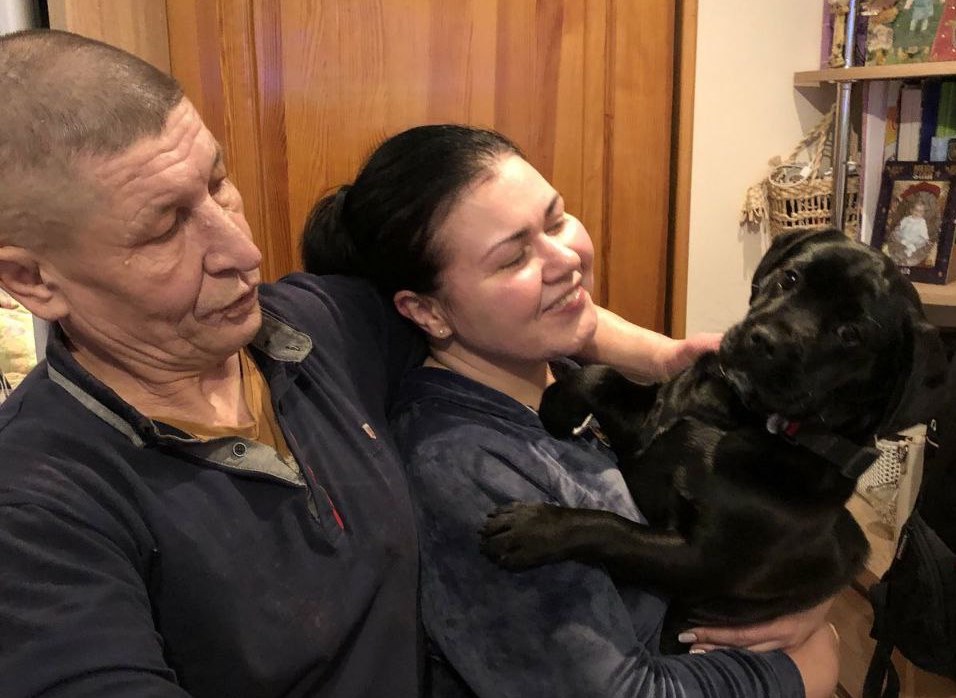 Oleh, Viktoria, and Lord / Photos provided by Viktoria
Oleh, Viktoria, and Lord / Photos provided by ViktoriaOn February 24, Yulia, the wife of Oleh’s nephew, called the Klimtsovs:
“Do you hear explosions? The war has begun.”
Viktoria and Oleh, of course, heard. A Russian landing party tried to land in Hostomel, just 7km of their house.
At the beginning of March, in the Telegram chat “Sklozavodska Street”, local residents began to write messages that convoys of Russian vehicles were driving along Varshavska highway. And a little bit later, a video of tanks crawling down their street was published.
Viktoria remembers her husband standing by the window and saying suddenly: “Viktoria, I see soldiers.”
“Where?” the woman asked.
In response, Oleh pushed back the curtain and pointed to an area under their balcony.
When the Russian military entered the town, I asked my husband: ‘Are we going to leave?’ He replied that if I wanted to, he would take me and my mother out. He said that he would not go himself, that he would not give them an inch of land. I answered: ‘I will not go anywhere without you.’ He was also worried about who would feed the animals, Viktoria recalls a conversation with her husband.
On March 3, she woke up in the morning, but neither her husband nor Lord was at home – they went for a walk.
When the husband returned, he was very calm, Viktoria recalls:
“He came in. Maybe he was nervous, but he didn’t show that. He said that he had been surrounded by about 30 soldiers. They pointed machine guns at him and accompanied him all the way to the house. Oleh was asked what his nationality was – his mother is Ukrainian, and his father is from Barnaul [Russia]. ‘Why do you live here if you are Russian?’ one of the soldiers asked. Oleh replied that that was his Motherland.”
Half an hour after that, someone began to knock persistently and loudly on the door of the couple’s apartment:
“Open the door! If you don’t open, we will shoot.”
Viktoria managed to throw the military documents of her husband’s nephew Andriy behind the chest of drawers, he participated in the anti-terrorist operation in eastern Ukraine. At the request of her daughter-in-law, Viktoria took the documents the day before from the apartment next door, where Oleh grew up, and then his sister lived with her family.
Two Russian soldiers entered the Klimtsovs’ apartment, two more remained on the landing:
“Your documents! Is there anybody else in the apartment?!“
Viktoria’s elderly mother was watching TV in one of the rooms – the electricity had not been turned off yet.
“What are they saying on TV? Do they say something about a truce?” the Russian soldiers asked.
The couple answered in general phrases.
“Well, don’t go outside. The shelling will soon begin, and you are civilians, right?” the soldier uttered the last part of the sentence with suspicion in his voice.
As soon as the soldiers left, Viktoria, laughing, asked her husband:
“Why are they all so small?“
Oleh explained to her that these were tank troops. The soldiers, as the woman remembered, were not only short, but also very young, in their 20s.
The entire Sklozavodska Street, which starts from the Bucha glass factory in Yablunivska Street, abuts the railway station and turns left, was filled with Russian military equipment – the units stood near shops, garages, residential buildings.
As the occupiers had warned, regular artillery fire and bombing began in Bucha.
As soon as they got stronger, Oleh helped his mother-in-law to go down to the basement under their house – the woman hardly walks on her own, using a walker. The man himself ran back and forth: from apartment to basement, from basement back to apartment. When there was gas still, Viktoria often stayed in the apartment baking bread.
Neighbors with their families lived in the basement: mostly women with children and elderly people. Russian soldiers also went there and asked who stayed in the basement.
When the gas supply was cut off, Oleh made an improvised fire: he burned rags and heated water on them for his family and neighbors. It was very cold, everyone wanted at least a drop of hot water. Later, the husband made two stoves of bricks for Viktoria next to the house, so that she would have more space.
They have not been disassembled yet, still standing in the yard.
The woman describes the relations between the neighbors during the occupation as united and friendly. Responsibilities were clearly divided between them. Some prepared food, others collected water from wells located in the nearby street. Those who had food stocks shared with those who did not.
People gathered in the yard every day from 07:00, stayed close. As soon as the curfew ended, “life began”: kettles, pots and pans were boiling on the fire, and food was being prepared.
“There were sunny days in March – everyone wanted to take as much heat as possible. Oh God, it’s like there’s no war when the sun shines – a person doesn’t need much,” Viktoria says tenderly. She recalls how once she and her husband even managed to take a steam bath in a secret bathhouse that the men had set up in a nearby garage a long time ago.
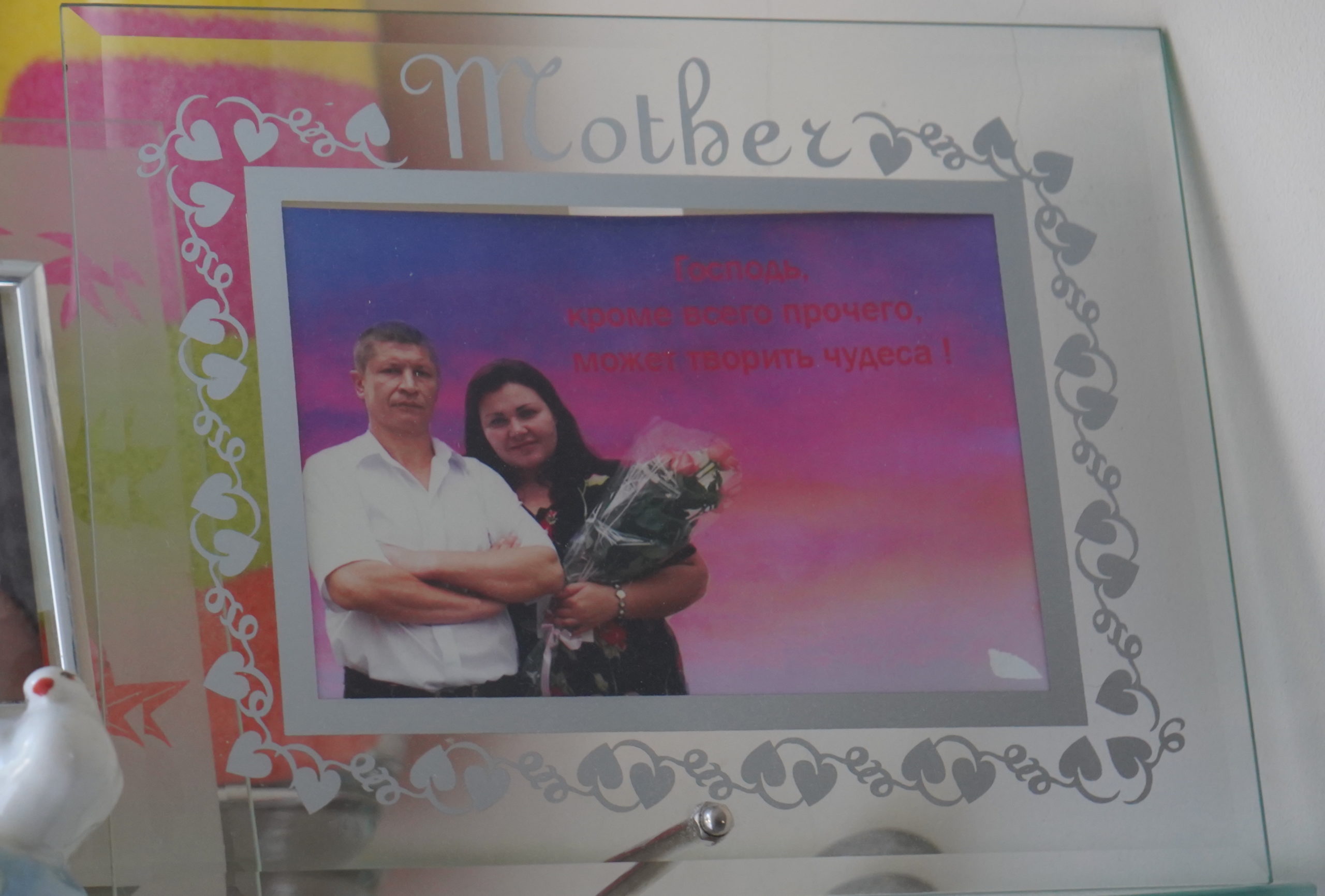 Viktoria and her husband
Viktoria and her husbandPeople tried to take care of their neighbors: they brought food to bedridden elderly, those who were known to have stayed at home and cannot go out.
At the same time, Viktoria also recalls tragic incidents. One day, acquaintances called the neighbors: they asked how their father was doing. His relatives did not warn anyone that he stayed in the apartment, the man himself did not make himself known either, and when they called to find out about him, it was too late. The guys knocked on the door of the apartment, says Viktoria, but the old man was already very exhausted as he spent almost two weeks without food and water. The neighbors tried to save him by giving enough water and food but the man died in a few days.
Since the beginning of the full-scale invasion, the Klimtsovs have maintained contact with their relatives. Oleh’s nephew was not in Bucha at that time but the couple knew that he was trying, despite the crazy risks, to get into the town to join the territorial defense unit.
At some point, he stopped answering calls.
On March 5, in the basement, a neighbor cautiously asked Viktoria:
“Haven’t you heard anything about Andriy?” Yulia [Andriy’s wife] called me and also asked if we had seen him. I asked my neighbor if she was holding something back. And she answered: ‘People say that he is no longer alive.”
Viktoria refused to believe that. She was afraid of telling her husband, she recalls, but she told still:
“I told him: Oleh, people say that guys from the territorial defense units were all shot dead.’ He began to call and ask his friends if they had any connection with Andriy. Then he went somewhere and came back all pale.”
Oleh brought with him a briefcase containing the documents of Andriy Dvornikov, his nephew, and Denys Rudenko. Oleh received the briefcase from their acquaintance, he was injured.
Viktoria’s husband was furious. He cried and shouted: “What will I tell my sister? I will not forgive them.” Oleh had a drink and went to a Russian checkpoint.
Then he told his wife that he had asked for a “senior” there, but the soldiers started shooting at his legs.
At night, in the frost, he crawled along Yablunivska Street in search of his nephew’s body. For three days in a row, as soon as the night began, Oleh was looking for Andriy. Viktoria prayed.
“He protected me, did not tell much. But when he returned, he said: ‘Viktoria, there are corpses out there. I lay down between them so that no one would see me.’ I asked if there were many corpses. He answered: ‘Quite a lot,” the woman says in a low voice, “Oleh could not bear the thought of his nephew’s death. He repeated: ‘This is my family, how could they do that.’ It bothered him that even if they found out that he was a former soldier, why was it necessary to shoot him immediately?”
Viktoria reassured her husband, saying that Andriy was smart and ingenious and that she believed he was alive.
“I convinced Oleh that the nephew was alive, so the husband eventually calmed down and focused on surviving and helping those around him to survive.”
The man took control of the distribution of food from the destroyed stores: so that everyone would have enough. Together with another neighbor – Vasyl Chekan – they also organized the delivery of water. They found a large plastic tank and attached it to the nephew’s car, which remained in Bucha.
Oleh also had a daily ritual of feeding abandoned cats and dogs. The man and his neighbor walked around the district and scattered food which Oleh had taken from a pet store near the house.
“Everyone there knew Oleh before the war. When there was nothing for the animals to eat, he broke down the door of the pet store. He kept repeating that when the owner returned, he would compensate her for everything,” Viktoria says.
Finding food and water took up most of the people’s time. They crawled for food at night to bombed-out stores, collected water under shelling. Everyone risked being killed by the Russian military.
People buried dead neighbors in yards when the Russians allowed them to. For three weeks, a minibus stood in Yablunivska Street near the Klimtsovs’ house with the bodies of seven people inside, until the Russian military allowed them to be buried in a local cemetery.
“I remember,” Viktoria recalls, “when the men went to get water, Oleh asked one of the neighbors: ‘Sanya, are you going or not?’ And he answered: ‘Oleh, I’m afraid’ and burst into tears.”
Tears suddenly appear in the woman’s eyes:
What I want to say is that no matter who I look at, there is no one like my Oleh. Some people say: “If he had been more careful, he would not have died.” And I know that if he had been more careful, many people would have died. It makes me so happy when I walk down the street and neighbors hug me and thank my husband for doing good for them. It makes me very happy but it also hurts at the same time. I wish I could be near him longer, consult, talk.
Gradually, people from the surrounding houses began to leave, shelled cars came occasionally and informed about the evacuation. Five families of neighbors remained in the basement where the Klimtsovs lived.
On March 28, Oleh left the house early in the morning, Viktoria heard how he and Vasyl were chopping wood.
The woman was about to leave when she suddenly heard a machine gun fire near the house. Viktoria’s hands and feet became numb, she wanted to run outside, but the bullets ricocheted off the windows.
Five minutes later, the woman dared to run out of the apartment. She saw an ax near one of the brick ovens, kettles and pans were boiling on the fire, Oleh’s jacket was lying nearby. But he was not there.
“I look at the car, a water tank rolled out of it all the way to the road. I saw someone lying face down near the car. I went cold inside. It was Vasyl. I approached the car but did not see Oleh. I thought he ran away, he was very fast for his age.”
The woman looked under the car, walked around it. Oleh was sitting in the front by the window – a bullet pierced his heart.
“My birdie,” Viktoria shouted. It seemed, she says, as if Oleh was sleeping. That’s how the woman remembered him.
Viktoria shows photos – a shot car, traces of blood on the pavement:
“That’s where Vasyl was lying. His face was torn. The men buried them both near the house, behind the garages.”
The day before, Viktoria recalls, she had a dream:
“I dreamed that I was standing with Lord on the platform, and soldiers were walking nearby with dogs on chains of different ages but all of the same breed. I don’t see soldiers themselves, only their army boots. At some point, my leash comes off and the soldiers take Lord on their chain. I shout to them: ‘Where are you taking him, he is still small.’ They say in Russian: ‘We need him.’ The dog looks at me tearfully. The soldiers get on the train, I run after him, but I don’t catch up.”
The woman told Oleh about her dream:
“He told me then that maybe the dream meant that a close friend would be taken away. It’s true that he is my close friend: once it’s happened, it’s for the rest of my life,” says Viktoria, crying.
She sees the symbolism of her dream in another way as well. On March 27 and 28, the woman says, the Russian military went on a rampage: they shot men of all ages indiscriminately.
“They shot dead Pasha who had a stroke recently. They shot dead uncle Tolia when he was just sitting on a bench near his house. And a woman was also shot, she was walking with collected water, they shouted to her: ‘Stop’, and she got scared and ran home. They shot her right through the door,” Viktoria names many more of those killed.
Also, she notes, other Russian soldiers – wearing black and dark green uniforms – shot people.
“Young guys standing at the checkpoint asked our people who were passing through it: ‘Where are the water carriers?’ They called Vasyl and Oleh that way. People answered: ‘You shot them dead.’ The Russians said that they didn’t know anything about that,” Viktoria recalls what people told her.
She does not know the reason for the mass killing of civilians. Viktoria says that someone heard Russians allegedly saying that “men dressed in civilian clothes killed Russian soldiers at one of the checkpoints, and now others are taking revenge for them.” Others said that they heard Russian soldiers saying: “We were ordered to shoot the male population.”
On the evening of March 28, Viktoria failed to get her mother down to the basement without her husband’s help. They waited out the airstrikes in the bathroom: Viktoria hid in a shower cabin, and her mother sat on the toilet bowl.
On March 29, there was no one in the courtyard of the high-rise building, where people usually gathered from the very morning: everyone was hiding, they were scared. And already on April 1, Bucha Mayor and the Ukrainian service members arrived in the town. The next day, volunteers took people out of Sklozavodska Street.
Viktoria says that she saw no point in staying in the town without water, gas, electricity, and most importantly, without Oleh:
“When our soldiers came to our apartment, my mother snapped: “I didn’t do anything.” She was sitting with a walker, wearing a diaper. I tell her that there were Ukrainian soldiers. They asked if we would go out ourselves. My mother was fully already in an instant,” the woman laughs and even closes her eyes, remembering this moment.
Past burnt and shot cars, the bodies of murdered people, crying as she left her husband’s body, Viktoria and her mother left for Cherkasy region.
“We recognized Andriy immediately.”
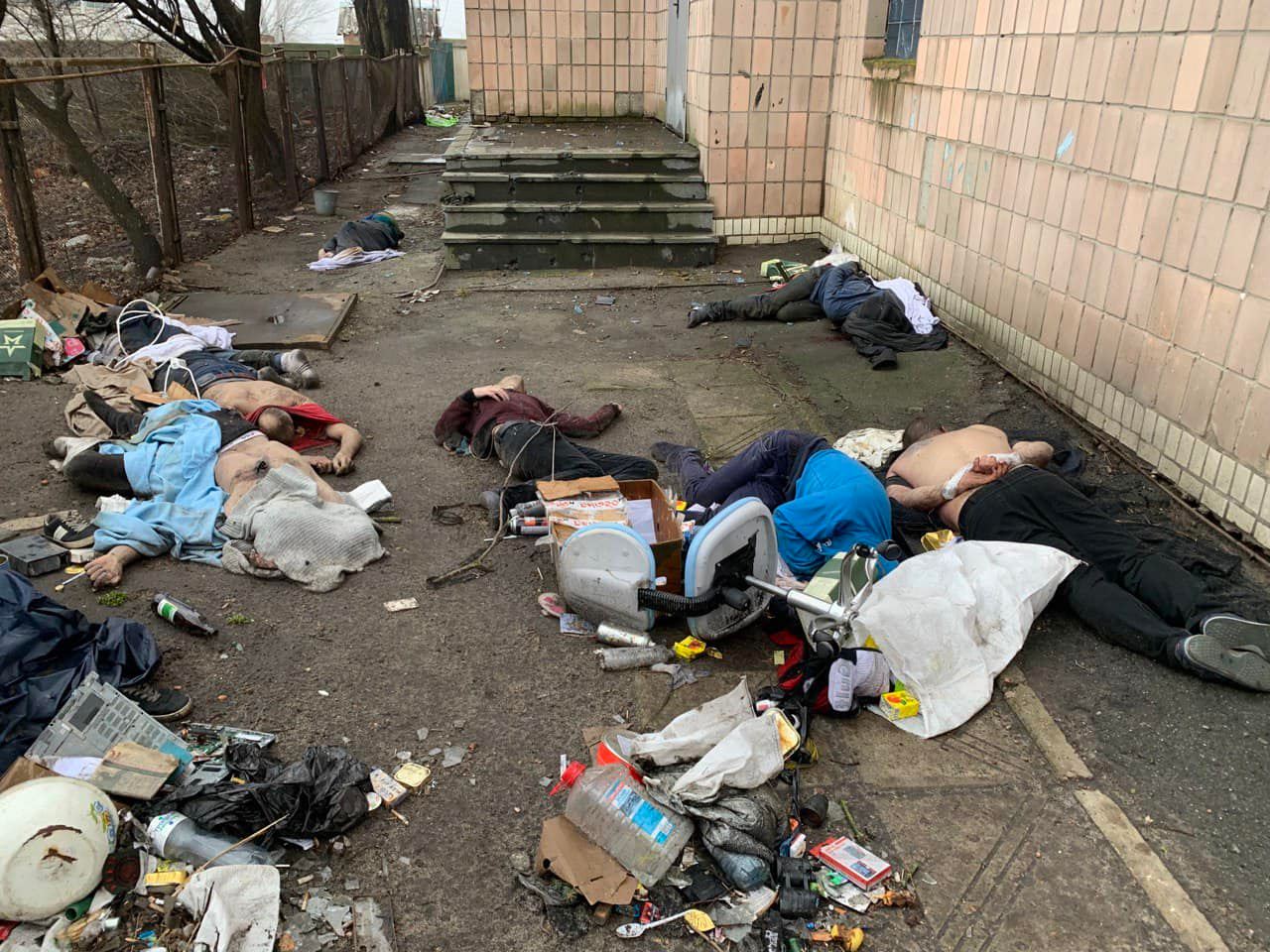 Andriy’s body, with his hands tied behind his back, lies to the right / Photo credit: Kateryna Prudka’s Facebook page
Andriy’s body, with his hands tied behind his back, lies to the right / Photo credit: Kateryna Prudka’s Facebook pageHe and seven other men were executed at 144 Yablunivska Street, 750m of the house, on March 4. The Russians searched them for tattoos that could indicate military affiliation and forced some to remove their winter jackets and shoes. Andriy had such a tattoo. One man managed to survive – 43-year-old construction worker Ivan Skyba, wounded in the stomach, he is currently under investigation under “high treason” charges.
In May, the NYT published in its investigation a photo taken with a CCTV camera. It shows blindfolded men with hunched backs holding each other, walking at a gunpoint of a Russian serviceman.
On April 11, the bodies of the dead and the killed were exhumed in Bucha. Yulia, Viktoria’s daughter-in-law, saw a photo of Oleh’s body on Telegram and wrote that she should return and take the body.
Viktoria returned from Cherkasy. On April 19, Ole was reburied at a local cemetery.
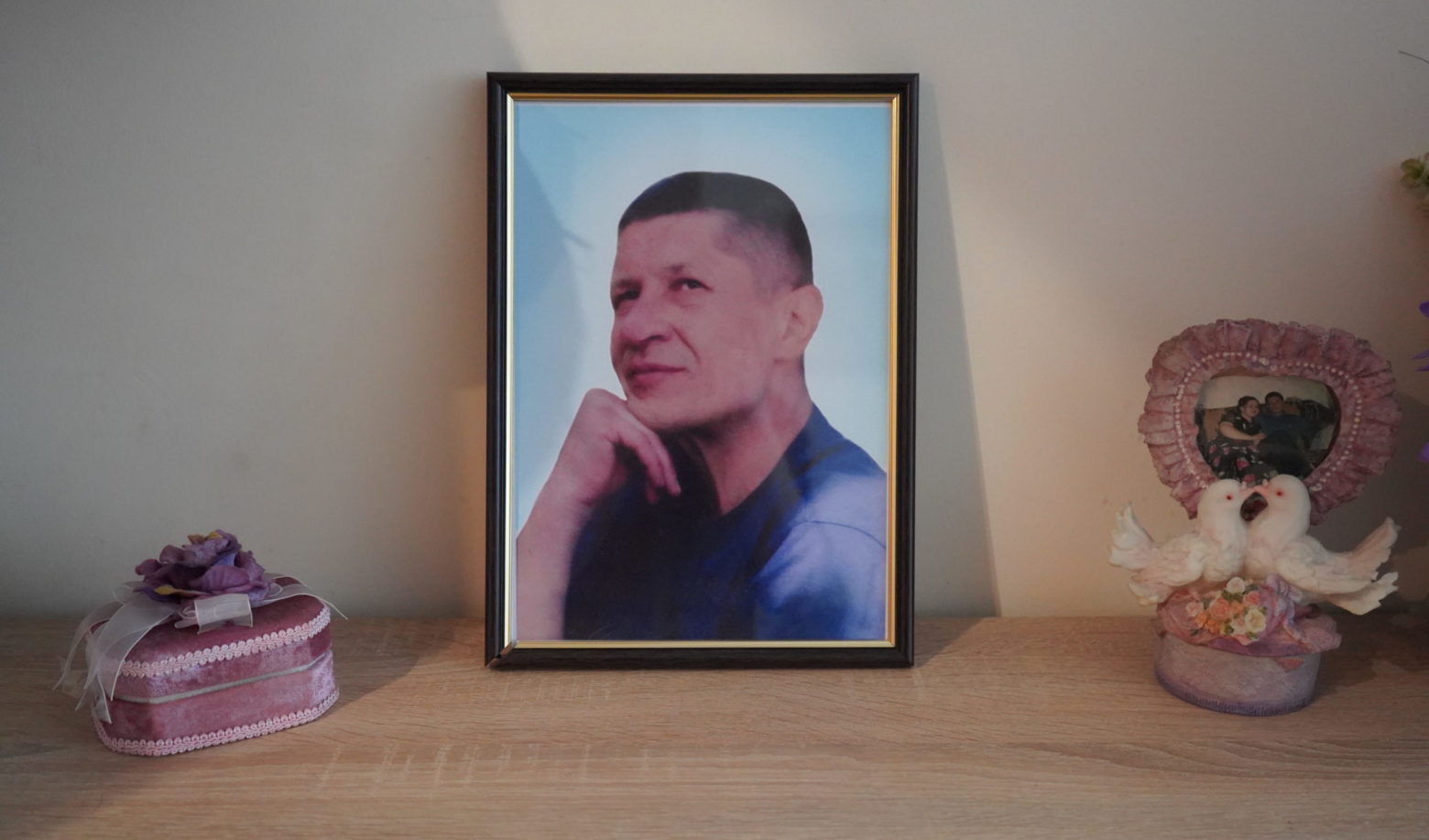 Oleh’s photo placed on his tombstone
Oleh’s photo placed on his tombstoneIn the certificate issued by the Bucha District Branch of the Kyiv Regional Bureau of Forensic Medical Examination, the cause of the man’s death was initially indicated as “multiple shrapnel wounds.”
“We left a morgue, read it, and Yulia said: ‘Come back.’ My hand on my heart, I say: ‘I am a witness, my husband was killed with a bullet, I have a photo.’ Then they rewrote the conclusion and added ‘bullet wounds’. And I know other people who were issued certificates with the incorrect cause of death.”
A little bit later, Viktoria, her mother, and dog Lord returned to Bucha permanently. The woman says that it was easier for her in Cherkasy. She does not sleep well now. At home, everything reminds her of husband:
“Recently, I’ve been thinking that I should go to a post office. And I see Oleh going out with a cigarette in his teeth, a leash in his hand.”
At the beginning of June, Viktoria wrote a report to the police on the murder of her husband, she wants to do the “right thing” so that the murderers do not get away with his death.
“I encourage everyone I know to write reports. They say: ‘We will be dragged round interrogations.’ That’s right, but does a lost life mean nothing? They [the Russian military] simply ruined our lives and they don’t even understand that. They are cursed. I have no right to hate, but they will be punished for what they did,” she believes.




